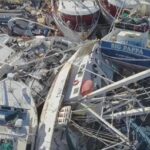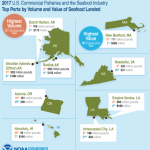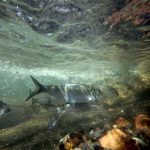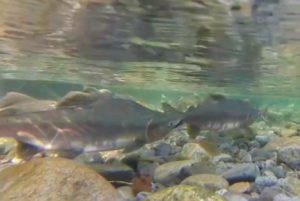Headline hype – Ocean ‘calamities’ oversold, say researchers
 The state of the world’s seas is often painted as verging on catastrophe. But although some challenges are very real, others have been vastly overstated, researchers claim in a review paper. The team writes that scientists, journals and the media have fallen into a mode of groupthink that can damage the credibility of the ocean sciences. The controversial study exposes fault lines in the marine-science community. Read the rest here 10:31
The state of the world’s seas is often painted as verging on catastrophe. But although some challenges are very real, others have been vastly overstated, researchers claim in a review paper. The team writes that scientists, journals and the media have fallen into a mode of groupthink that can damage the credibility of the ocean sciences. The controversial study exposes fault lines in the marine-science community. Read the rest here 10:31















































There is no finer example of oversold ocean calamities than the “Oceans of Abundance” gem. It’s worth it to look through the text linked below because this is one of the most blatant pieces of agenda-driven hyperbolic and sensationalistic fisheries management “science” ever.
http://www.edf.org/sites/defau…
It is written by such fisheries research luminaries as Costello, Lubchenco, Steven Gaines, Andy Rosenberg, and Ellen Pikitch, to name a few. Many of the talking points in this lobbying paper use references from Myers and Worm and Pauly—of nothing-left-but-jellyfish fame.
The paper (or leaflet is perhaps a better term) is laced with words such as decimated, depleted, destroyed, ruined, emptied, food source in jeopardy etc. describing the fisheries as near extinction and set up for a drastic new management regime: catch shares. Actually catch shares is nothing more than a privatization scheme which had been in existence for decades throughout the world’s fisheries with mixed results and some countries such as Iceland and Scotland were trying to get back to days-at-sea “input controls”. In fact, in 1994 the New England Fisheries Management Council had considered catch shares and rejected them out of consideration for their inherent costs and inequities.
The “Oceans of Abundance” paper starts out with a display of the ‘conveners” and funders of this “study” and the hyperbolic text goes downhill from there. Here the EDF et al lobbyists literally write the fisheries policy with this new Obama administration arm-twisting “Oceans of Abundance: Action Agenda for America’s Vital Fishing Future” aka the campaign for the selling of catch shares.
“Oceans of Abundance was developed by an independent, bipartisan working group consisting of 23 prominent leaders in government, fisheries science, management, and policy. The working group was convened by Environmental Defense Fund, Marine Conservation Biology Institute, and World Wildlife Fund. Its purpose is to present policymakers with coherent, achievable methods — based on the most current scientific consensus — to reverse the economic and environmental decline of U.S. fisheries and the communities that depend on them. Generous support for this report was provided by the Walton Family Foundation.”
From pg. 4 of “Oceans of Abundance”
“Evidence is overwhelming. The global oceans are being emptied of seafood. Scientists report that 90% of large fish — highly sought after species like tuna and swordfish — have been removed from the oceans. There is scientific consensus that fishing is fundamentally altering ocean ecosystems, which are increasingly likely to yield massive swarms of jellyfish rather than food fish.” (This little power-pack paragraph, compliments of Myers and Worm and Pauly—Boris Worm later recanted when pressed by Ray Hilborn and others on this jellyfish thesis and admitted he used “hyperbole” justified only by the dire seriousness of his ocean-saving mission.)
So straight from the environmental NGO Lobbyists’ Playbook the remedy headline and total cure for this ocean fisheries Armageddon reads:
“To unleash innovation for economic and ecosystem renewal in the oceans:
—President Obama should ensure that all federal fishery management plans are evaluated for catch shares by 2012, and that at least 50% of federal fishery management plans feature catch share management by 2016.
—The U.S. Congress should ease bottlenecks in order to achieve the President’s goal by passing legislation to require that catch shares be considered in all fishery management.”
Benefits of Catch Shares: (page 7)
“Catch shares prevent, and even reverse the collapse of the world’s fisheries. The journal Science recently published the most comprehensive study of catch shares to date. The study, by Costello et al., examined the fate of more than 11,000 fisheries around the world, and found that catch share fisheries remain stable in the long term.”
“Catch share fisheries are more productive. Heal and Schlenker, writing in Nature, showed that in the 17 years after implementation, catch shares had driven a large increase in catch (on the order of four-fold) — while those fisheries remained stable.”
“Catch share fisheries meet conservation targets and improve economic performance. A detailed look at U.S. and British Columbia catch shares showed that fishermen comply with catch limits — even catching 5% less than their allowable limit. In those same fisheries, revenues per boat increased by 80% due to higher yields and higher dockside prices. In addition, bycatch decreased on average 40%. In the first year of the Gulf of Mexico’s red snapper catch share program, NOAA reports that commercial fishermen fully complied with catch limits and considerably reduced bycatch.”
“Catch share fisheries can help restore natural wealth. According to the World Bank, catch shares and other reforms can drive economic growth. Costello and Gleason conservatively estimate that catch shares could double the net economic value of U.S. commercial fisheries.”
Actually, none of those promises were to be realized now 5 years after the imposition of catch shares in May of 2010. The New England ground fishery is in shambles due to shoddy stock assessments, the consequent draconian regulations and the consolidation of the fishing fleet in the hands of outfits such as Cooke Aquaculture (who just bought up a large chunk of the east coast’s Scallop Industry. This all essentially thanks to catch shares.
On page (7) EDF predicts in a graph that in 5 years after imposition Catch Shares will increase fishing revenues by 169% and:
“Taken together this evidence demonstrates a path toward a more stable food supply, better economic returns, and a healthier ocean. This is strong evidence that catch shares end overfishing, and offer a welcome message of hope from leading scientists.”
Again reality has not been kind!
“Catch shares provide the best strategy for protecting fishing jobs, tens of thousands of which have already been lost in collapsing fisheries. Under current management labor is needed for just a few short days [? —don’t ask me, this sentence is way beyond my creative ability—I guess they’re referring to their simplistic notion of “derby/pulse fishing”]. Catch shares, on the other hand, often allow fishing seasons to be dramatically extended, spreading out the economic benefits across an entire year. Until fisheries recover, the same labor hours are needed. And under catch shares the jobs are much more likely to be full-time.”21 (EDF, as usual, references EDF as support for their EDF argument.)
Here are a couple of the paper’s political “Shoulds” for President Obama (Page 8) that will be particularly telling for anyone who has lived through the results of this privatization and consolidation atrocity:
“Work with Congress to make catch shares a priority in the first 100 days.”
Done: Jane Lubchenco, catch shares champion, was appointed as NOAA’s National Marine Fisheries Service director and Under Secretary of the Department of Commerce.
“Appoint committed leaders for the Department of Commerce and regional fishery management councils who will drive economic and ecosystem renewal in the oceans.” Done: the regional councils were stacked with pro catch share voting members.”
To end, a quote from one of the leaders in the quest for profitability in the fisheries:
“Catch shares can provide real hope for the sustainability of American fisheries and fishing communities.”
Dr. Andy Rosenberg, former Deputy Director, National Marine Fisheries Service
One of the major premises of catch shares efficacy is total observer coverage on the fishing vessels at sea and Professor Rosenberg, a staunch supporter of catch shares (and extensive observer coverage), opened an agency, MRAG Americas, Inc. which coincidentally supplies observers for NOAA management.
“Mission Accomplished”
I wonder when the Libraries will be changing the coding on “OCEAN OF ABUNDANCE”. The Dewy&Huey DISMAL SYSTEM should move this piece of PULP FRICTION over to the Fiction section of the Library. Leaving behind the likes of “DEN OF THIEVES”. Oh that’s right Mikey Miliken is a major Charracter in that Non-Fiction selection. His brother started the Miliken Institute supporters of Catch Shares and the Comodorizing of such.
I think Andy left a couple Vowels out of His Company Name i.e. an i and an e. Placement shouldn’t strain the Brain too much…
Kudos Dicky, nice job.
Such as this total BS Piece by none other than the NY Times :http://www.nytimes.com/2015/01/16/science/earth/study-raises-alarm-for-health-of-ocean-life.html?_r=1
I agree Bill. Trying to avoid putting it up. Another dogma study by USB. It has the smell of Pew all over it.
Originally that would be CRUDE…